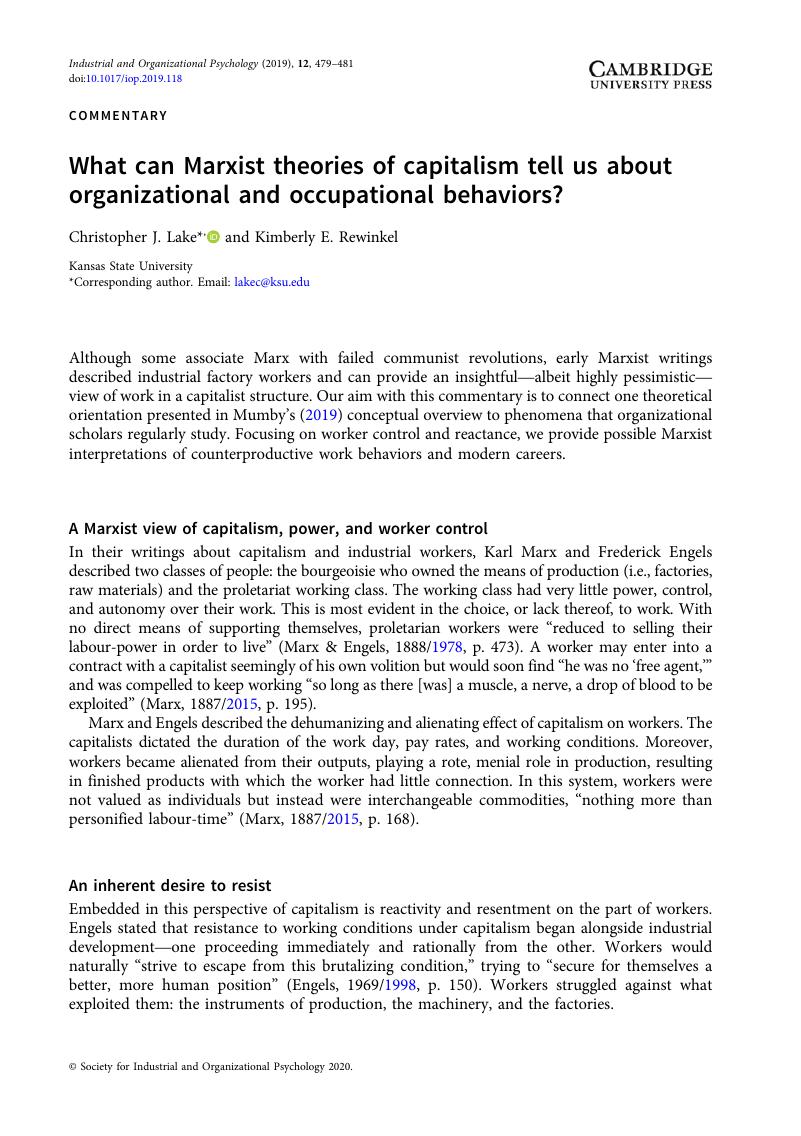No CrossRef data available.
Article contents
What can Marxist theories of capitalism tell us about organizational and occupational behaviors?
Published online by Cambridge University Press: 14 January 2020
Abstract
An abstract is not available for this content so a preview has been provided. Please use the Get access link above for information on how to access this content.

- Type
- Commentaries
- Information
- Copyright
- © Society for Industrial and Organizational Psychology 2020
References
Arthur, M. B., & Rousseau, D. M. (1996). The boundaryless career: A new employment principle for a new organizational era. Oxford, UK: Oxford University Press.Google Scholar
Berry, C. M., Carpenter, N. C., & Barratt, C. L. (2012). Do other-reports of counterproductive work behavior provide an incremental contribution over self-reports? A meta-analytic comparison. Journal of Applied Psychology, 97, 613–636.CrossRefGoogle ScholarPubMed
Brehm, J. W. (1966). A theory of psychological reactance. New York, NY: Academic Press.Google Scholar
Dalal, R. S. (2005). A meta-analysis of the relationship between organizational citizenship behavior and counterproductive work behavior. Journal of Applied Psychology, 90, 1241–1255.CrossRefGoogle ScholarPubMed
Engels, F. (1969/1998). The condition of the working class in England. Retrieved from https://www.marxists.org/archive/marx/works/download/pdf/condition-working-class-england.pdf.Google Scholar
Fox, S., Spector, P. E., & Miles, D. (2001). Counterproductive work behavior (CWB) in response to job stressors and
organizational justice: Some mediator and moderator tests for autonomy and emotions. Journal of Vocational Behavior, 59, 291–309.CrossRefGoogle Scholar
Lake, C. J., Highhouse, S., & Shrift, A. G. (2018). Validation of the job-hopping motives scale. Journal of Career Assessment, 26, 531–548.CrossRefGoogle Scholar
Lyons, S. T., Schweitzer, L., & Ng, E. S. W. (2015). Resilience in the modern career. Career Development International, 20, 363–383.CrossRefGoogle Scholar
Marx, K. (1887/2015). Capital (Vol. I). S. Moore & E. Aveling (Trans.). Retrieved from https://www.marxists.org/archive/marx/works/download/pdf/Capital-Volume-I.pdf.Google Scholar
Marx, K., & Engels, F. (1888/1978). Manifesto of the Communist party. In Tucker, R. C. (Ed.), The Marx-Engels reader (2nd ed., pp. 473–500). New York, NY: W. W. Norton.Google Scholar
Mumby, D. K. (2019). Work: What is it good for? (Absolutely nothing)—a critical theorist’s perspective. Industrial and Organizational Psychology: Perspectives on Science and Practice, 12(4), 429–443.Google Scholar
Wrzesniewski, A., LoBulgio, N., Dutton, J. E., & Berg, J. M. (2013). Job crafting and cultivating positive meaning and identity at work. Advances in Positive Organizational Psychology, 1, 281–302.CrossRefGoogle Scholar


